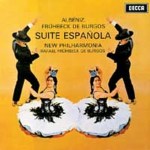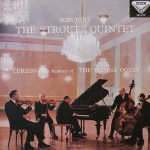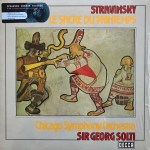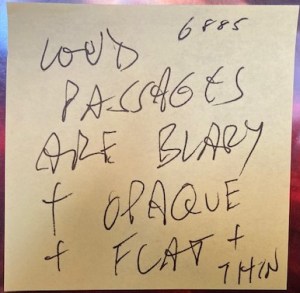 More of the Music of Sergei Rachmaninoff (1873-1943)
More of the Music of Sergei Rachmaninoff (1873-1943)
Reviews and Commentaries for Rachmaninoff’s Piano Concertos
For some background, in 2005 we were still selling Heavy Vinyl. We were fans of DCC and Cisco and carried many of the Speakers Corner remasters.
But things were starting to look grim. With every improvement to our playback system, these modern reissues seem to be falling further and further behind.
In the late-’90s, Classic had released some Mercury titles which we’d auditioned and disliked immensely. In 2005 it was Speakers Corner’s turn to have at the Mercury catalog, and they went a different way, finding a “new sound” for the legendary recordings, completely unlike any vintage pressing we’d ever heard.
This was very upsetting. I felt the need to say something.
By 2007 it was clear that Heavy Vinyl was a lost cause and had no business being sold by any audiophile record dealer who cared about sound quality, most especially me. And that was the end of it. This Mercury was one of the records that helped me see the error of my ways.
Part 1 of this discussion of Speakers Corner’s Mercury Series can be found here.
A blog entry on the site from 2005 about the new Mercury reissue series that was coming out noted that:
I am expecting the new Rach 3rd (90283) later this week, and will report my findings as soon as I have a had a chance to evaluate it.
[A few weeks later I followed up with this:]
The news on 90283 is here. It came today. Are you ready? In one sentence:
The most opaque, dull and lifeless 180 gram reissue in the history of the world.
My blog entry from 2005 continues below, transcribed practically word for word.
I hope it’s becoming clear to people now that this series is an enormous fraud perpetrated against all right thinking (right listening?) audiophiles. I can’t imagine a worse sounding record. It makes the most opaque ’70s Phillips or London LP sound positively transparent next to this thick piece of crap. I pulled out my late label copy, far from the best sounding pressing I’ve ever heard, and it killed the new version. The trumpets sound like they’re playing from under a pile of blankets on this 180 gram LP. The sound is so bad it defies understanding.
And the sad thing, in some ways the saddest aspect of this very sad affair, is that I can safely predict right now, with absolutely no fear of being proved wrong, that every major record dealer will rave about it. Mark my words. Every one. Except me of course. But I’m not one of the majors. Thank god I don’t have to sell crap like this to make a living.
And every audiophile who reads a rave review in a dealer’s catalog or on a website should take it for precisely what it is: a naked grab for his money, nothing more, nothing less. It’s all about the money. It’s not about the sound. It’s not about the music. It’s just about money.
Any record dealer who would stoop low enough to take money for a record this bad is telling you something very important about his business: he either can’t tell a good record from a bad one, or he doesn’t care. Either one would make me take my business elsewhere. How do these guys stay in business? (Maybe the fact that most of their catalogs are now given over to equipment explains it.)
And you should be outraged at this kind of fraud. If you give money to retailers who so obviously have nothing but contempt for you, you share in the blame. You’re keeping these guys in business. It makes me think of the scene in Network where Howard the veteran newscaster talks directly to his audience:
So, I want you to get up now. I want all of you to get up out of your chairs. I want you to get up right now and go to the window. Open it, and stick your head out, and yell: ‘I’m as mad as hell, and I’m not gonna take this anymore!’
I want you to get up right now. Sit up. Go to your windows. Open them and stick your head out and yell – ‘I’m as mad as hell and I’m not gonna take this anymore!’ Things have got to change. But first, you’ve gotta get mad!…You’ve got to say, ‘I’m as mad as hell, and I’m not gonna take this anymore!’
After playing this new Mercury, I was filled with questions.
What is to become of the record business?
Do we really need records that sound worse than the worse sounding CDs, at twice the price?
Should record dealers really be selling this crap?
Are audiophiles really being fooled by it?
Is it that easy?
Forget easy: How is it even possible?
When a record is this bad, doesn’t everybody hear it?
And if not, why not?
Hey folks, I’m just trying to find you some Better Records. That’s how I see my job. The current crop of companies producing new records — with a few exceptions like Cisco, S&P, even the new MoFi — are not making my job very easy, I can tell you that. [This is embarrassingly wrong of course. The bulk of the records put out by these labels did not stand the test of time.]
I don’t know what these other guys selling this crap are trying to do. It sure doesn’t have much to do with better records.
 So back to the Mercuries.
So back to the Mercuries.
Speakers Corner has a pretty spotty track record when it comes to making records. Some of their stuff is just junk. (Steely Dan, The Planets, We Get Requests — I could name fifty bad to truly awful sounding records they’ve made over the years.) We actually created a section for some of them, but there are so many I couldn’t find the time to list them all.
You’ll notice that we only carry a small fraction of the 100+ classical titles Speakers Corner has done, about fifteen at last count. They do better with Jazz; there we sell about twenty five of the better titles. Overall score? I would say one out of four is about right. Not bad. Not good, but not bad.
But better than the originals? That’s a preposterous claim that’s hardly worth responding to. But I had a few things on my chest I wanted to get off, hence today’s screed.
So why do we carry them? Well, some of them may be decent. I may not ever know though. They are so damn expensive due to the current exchange rates that I may not review them at all, as there is simply no profit in these records anymore.
Buyer beware obtains, but at least I’m honest about it, unlike some audiophile record dealers who want to hype these Mercuries as the Second Coming of Golden Age Vinyl. That, they definitely are not. (The First Coming was good enough for me, as you know. I am firmly on record as saying that the RCA, Decca, Mercury, London, etc. originals are the best sounding records ever made, bar none, and nothing I’ve heard has provided a shred of evidence to the contrary.)
Reports from ears I trust are not good, but that’s just on the Ravel disc. The originals are a fortune, the CDs don’t cut it, so what’s a mother to do?
(more…)


 More of the Music of Sergei Rachmaninoff (1873-1943)
More of the Music of Sergei Rachmaninoff (1873-1943) So back to the Mercuries.
So back to the Mercuries.





 More on The Firebird
More on The Firebird
